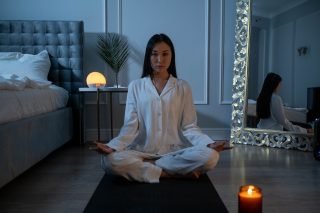It’s the festive season which means late nights, lots of drinks, and travel. All of this results in us getting less rest over the holiday season. But getting enough sleep and resting is vital for the human body.
By far, of all the healthy habits to try to hold on to during the holiday season, getting the right amount of rest is most important. But with all the temptations of late-night dinners and staying up to chat with friends and family, how can you maintain your sleep schedule during the festive season?
Why is sleep so important?
 A good night’s rest is a vital part of living a healthy life. In fact, experts say that sleep is as significant as diet and exercise. Poor sleep has an immediate negative effect on the body. Lack of sleep can cause hormone imbalances, reduce exercise performance ability and even reduce brain function.
A good night’s rest is a vital part of living a healthy life. In fact, experts say that sleep is as significant as diet and exercise. Poor sleep has an immediate negative effect on the body. Lack of sleep can cause hormone imbalances, reduce exercise performance ability and even reduce brain function.
In other words, sleep is vital, and the better the quality of your sleep, the better the quality of your day. Lack of sleep can increase your risk of high blood pressure, diabetes, and coronary heart disease. When you wake up often, your body triggers a fight-or-flight response. When this happens in tandem, the body can’t compensate for the rise in blood pressure.
Your blood pressure can remain higher than normal and increase your risk of stroke or coronary heart disease. A good night’s sleep can also help boost the immune system, reduce stress levels, boost mental health and even aid with learning and remembering. It can also help to keep your mind focused on the task at hand throughout the day. When you haven’t had enough sleep, your attention span, ability to concentrate, and even risk assessment and reaction times can be affected. When you aren’t sleeping enough, you’re more likely to crave sugar to boost your energy. Some research even suggests that “being sleep-deprived changes the level of hormones that signal hunger and fullness in your body”.
How Do Holidays Affect Sleep?
Traveling and short days during winter are an issue
Each cell in our bodies has a self-regulating clock that controls various bodily functions, all of these cells need to work in unison. Our brains help keep our bodies synchronized by producing the hormone melatonin. This hormone is regulated by the amount of light that enters our eyes. Not getting enough sunlight or traveling through time zones can also affect our body’s natural clock. This can make it hard to fall asleep at night as the production of melatonin is disrupted.

Photo by Anshath Ahamed from Pexels
Many people, most especially school children and shift workers, seem to suffer from seasonal sleep pattern disruptions. Teenagers tend to go to sleep too late and then wake up too late which disrupts their bodies’ internal clock. This can affect concentration and interfere with their school work. Some studies have even shown that shift workers are at higher risk of developing certain types of cancer due to irregular sleep patterns
How to combat sleep disruption when traveling
If you’re traveling to a different time zone or country for an extended period of time, gradually shift your bedtime closer to your destination. Your body will gradually adapt to the change and will not be shocked when you do change time zones. Doing this in reverse during the holiday can also help with returning to normal patterns when you get back home. It’s also best to drink plenty of water during your journey as this helps to combat any potential jet lag. Stimulants such as coffee and alcohol should also be avoided as they can worsen jet lag. Ideally, get to your destination before the evening sun sets so that you can enjoy some sunlight. This will also help to regulate your body clock and may aid your body to sleep during the night.
Other ways to get enough sleep over the holiday season (whether you’re away or at home)
Don’t drink too much: Over the holiday season, we seem to end up drinking more. But avoid overconsumption of alcohol. Drinking alcohol may feel as it’ll help you fall asleep faster. But often, it can cause you to sleep less. Alcohol consumption can also affect your quality of sleep.

Photo by cottonbro from Pexels
Don’t overeat: Overeating can cause your stomach to digest for a long time, which can make it hard to fall asleep. If you’re planning on consuming a lot of sweets during the holiday season, eat them earlier in the day rather than later to help your stomach in digesting them.
Get some exercise outside: Getting active is a great way to improve sleep quality. It’s also a great way to distract yourself from the daily grind and enjoy the holiday season. You don’t have to go crazy with hardcore sports, even just taking a walk with your dog will help. This will also get you outside into the fresh air. This can help to boost the body’s natural circadian rhythm and increase melatonin production.
Take a break from electronics before bed: Take time to enjoy the holidays and the multitude of activities. Instead of watching TV, try doing more relaxing activities such as building gingerbread houses or playing board games. Electronic devices can disrupt your internal clock and interfere with your sleep because they emit blue light. This is interpreted by the brain as a sign of daytime which affects melatonin production.
References
https://www.bupa.co.uk/newsroom/ourviews/nine-benefits-good-night-sleep
https://www.sleepdunwoody.com/blog/2019/11/25/stay-well-rested-holiday-season/



![women [longevity live]](https://longevitylive.com/wp-content/uploads/2020/01/photo-of-women-walking-down-the-street-1116984-100x100.jpg)










